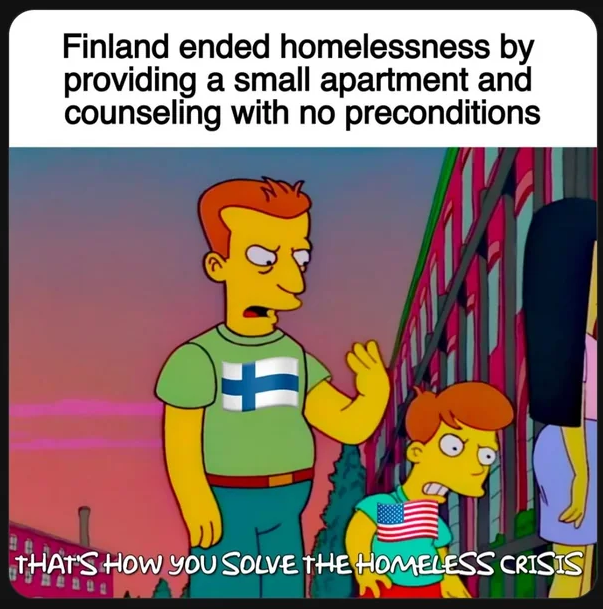this post was submitted on 28 Apr 2024
1380 points (98.1% liked)
Political Memes
6107 readers
1891 users here now
Welcome to politcal memes!
These are our rules:
Be civil
Jokes are okay, but don’t intentionally harass or disturb any member of our community. Sexism, racism and bigotry are not allowed. Good faith argumentation only. No posts discouraging people to vote or shaming people for voting.
No misinformation
Don’t post any intentional misinformation. When asked by mods, provide sources for any claims you make.
Posts should be memes
Random pictures do not qualify as memes. Relevance to politics is required.
No bots, spam or self-promotion
Follow instance rules, ask for your bot to be allowed on this community.
founded 2 years ago
MODERATORS
you are viewing a single comment's thread
view the rest of the comments
view the rest of the comments

Because slave labor is notoriously inefficient relative to precarious industrial labor (particularly as your prison population ages), the cost of incarceration eclipses the savings (especially as housing/energy costs climb), and the cruelty inflicted on the populous undermines the health and well-being of the overall population in a way that stunts technological and cultural development.
States like Mississippi, Louisiana, Arkansas, and Oklahoma are case studies in economic mismanagement through mass incarceration. Four of the highest incarceration rates in the country and some of the worst economic growth in the nation.
Trying to treat homelessness through incarceration is a bit like trying to treat malnutrition through cannibalism. The policy is inherently wasteful and destructive, sacrificing far more than one might hope to create.
The real value of mass incarceration is not in the people you incarcerate but in the submissive atmosphere you cultivate outside the incarcerated group. Mass arrests create a functional economic blacklist of racial cohorts and social dissidents. Associating with these people can be as poisonous for your welfare as being one of them. And "high crime" neighborhoods can be targeted for "economic redevelopment" which often means mass displacement of residents through state seizure of property and other "slum clearance" measures.
I don't doubt there's cynicism in the modern incarceration system. But it goes a lot deeper than just "arrest a guy and press gang them". An enormous component of the War on Crime was busting up minority social welfare groups (The Black Panthers, most famously, but ACORN and BLM in more recent iterations) and scattering their non-incarcerated members.
We're seeing the same thing play out on college campuses. Organizers and leaders are targeted for arrest and expulsion in order to break up cliches of students focused on that individual leadership.
Short term profit is all that’s considered, longevity is disregarded.
Even in the short-term, mass incarceration is - at best - a loss leader. And if you look at what's happening in the UK right now, even their police and prisons are getting cannibalized by a government intent on gutting every conceivable public service.
They're farther along the death spiral than we are, but we're all headed in the same direction.
You're missing a critical point. The cost of housing the inmates is borne by the taxpayers. The profit from the labor is reaped by the corporations. It doesn't matter how inefficient it is, all the costs are borne by taxpayers, so it's perfect for businesses.
The cost of housing prisoners is far higher than the cost of housing the homeless. And it isn't as though incarcerated people weren't employed prior to arrest.
Moving a farm worker or a retail clerk to a chain gang isn't economically efficient even discounting the moral atrocity.
It matters immensely. And you can see it in the sector growth of states with high incarceration rates.
The motivations behind this policy aren't purely economic. A lot of it just boils down to fascist bigotry.
The cruelty isn't a means to an end. It is the end itself.
You fantastically missed the point.
From a company's perspective, you have rock bottom labor costs but you can sell your product at whatever price the market will bear.
You're considering "the economy" as a single unit but it's not. The public and private spheres have very different interests, and the private sphere is generally much more powerful.
Piecework by convicts is rarely quality
True, but the margins are still fantastic, despite the lower selling price of the goods due to lower quality.
It doesn't need to be quality.
https://apnews.com/article/prison-to-plate-inmate-labor-investigation-c6f0eb4747963283316e494eadf08c4e#:~:text=Almost%20all%20of%20the%20country's,hour%20if%20anything%20at%20all.
Who takes the rest? The prison.
Look up what these jobs produce and how they are remunerated.
The major "desired" impact, I suspect, is not in direct profits from the slave labor but in the wage suppression that it causes outside of the prison population.